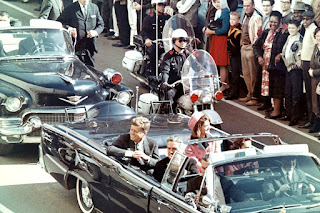Livia Gershon
JSTOR
April 20, 2023
It’s become a cliché that conspiracy-minded internet users insist they’ve “done their own research.” As historian Kathryn S. Olmsted writes, that’s something people have been saying since the assassination of US President John F. Kennedy, and officials’ response to it, helped to shatter many Americans’ faith in the government.
Olmsted writes that, immediately after the assassination, top leaders suspected some kind of conspiracy. Vice President Lyndon Johnson later said he did not believe Oswald acted alone but feared disaster if foreign actors were discovered to be behind the assassination. He convened the Warren Commission to officially put these worries to rest.
And it kind of worked. Between the assassination and the release of the Warren Report in September 1964, the proportion of the public who suspected a conspiracy dropped from 62 percent to 31 percent. But some people remained deeply suspicious. Olmsted describes ordinary women from around the country taking on the job of solving the case. Shirley Martin of Hominy, Oklahoma, packed up her four kids and a dog, traveled to Dallas, and interviewed more than 50 people, including the priest who gave JFK the last rites. In Beverly Hills, Maggie Fields filled her home with file boxes, scrap books, and charts. Lillian Castellano had a map of the Dallas sewer system mailed to her Los Angeles home so she could see whether another gunman might have hidden in a storm drain.
Around the country, regular people like these developed a network to share their findings. As Castellano wrote to a fellow researcher, “there are thousands of little people like you and I—all not satisfied—all wanting the truth.”
In the decade that followed, Olmsted writes, the Vietnam War and the Watergate scandal fueled more skepticism. In 1975, Senator Frank Church led a major inquiry into secret government operations, revealing information about the CIA’s plots against Castro, the FBI’s harassment of Martin Luther King Jr., and other nefarious activity. The Iran-Contra scandal of the 1980s lent further credence to conspiracy theorists. If top government officials ignored the law, worked with drug smugglers, and sold arms to terrorists, it seemed there was no limit to what they were capable of.
At the turn of the twenty-first century, it was no big stretch for many Americans to buy into the notion that officials had prior knowledge of—or were even behind—the attacks of September 11, 2001. Like the JFK conspiracy theorists before them, 9-11 truthers conducted their own research and shared their findings. The internet made that easier than ever, just as it facilitated later conspiracies like QAnon.
Olmsted argues that citizen researchers have performed a service to the country, helping to win the release of documents that reveal secrets about our government. Yet they’ve also played a role in shattering the trust that Americans place in the basic workings of democracy.
“The result is a profoundly weakened polity,” she writes, “With fewer citizens voting and more problems left unaddressed for a future generation that is even more cynical about the possibility of reforms.”
https://daily.jstor.org/jfks-assassination-and-doing-your-own-research/


No comments:
Post a Comment